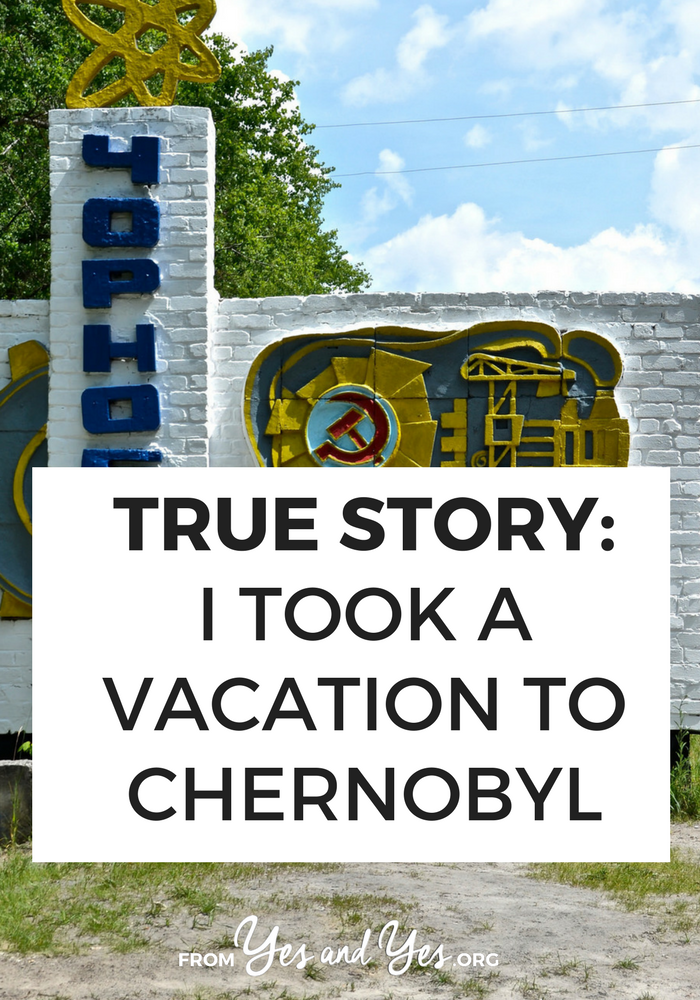
Would you want to spend your limited vacation days at the site of a nuclear disaster? Would you ever travel to Chernobyl, like, on purpose? I might! And it turns out, I’m not alone!
Today, Jenni tells us all about her trip Chernobyl, Ukraine.
Tell us a bit about yourself!
Hi! I’m Jenni, a long-time (2001!) blogger over at byjenni.com. I live in the UK with my boyfriend and five cats. I love writing, baking, photography, and visiting unusual places.
For those of us who don’t know, what’s Chernobyl’s history?
Chernobyl, in Ukraine, is the site of one of the world’s worst nuclear disasters. In 1986, the nearby power plant exploded, causing radioactive material to fall across large parts of Europe. You can read more about what caused it and the effects here. Today it’s relatively safe to visit, although there are heavy restrictions and it’s largely abandoned.
What made you want to visit Chernobyl?
I read a really interesting article called The Woman Who Ate Chernobyl’s Apples, and after that it was on my bucket list. My boyfriend and I have a pact to go on at least one ‘wildcard’ trip each year (last time was husky sledding in the Arctic Circle), and Chernobyl ended up at the top of the list.
Walk us through the process of planning this trip.
We travel quite a lot, but this trip was so different to anything else we’ve done. I did a lot of online research before we even thought about going. There are a couple of companies who offer Chernobyl tours, and they have government officials (recognisable by their camo gear) as staff on the trips to ensure everything is regulated.
I don’t normally comment on tour companies, but the people at Chernobyl Welcome were so brilliant. They kept us safe, shared a lot of interesting information, and had a fantastic sense of humour.
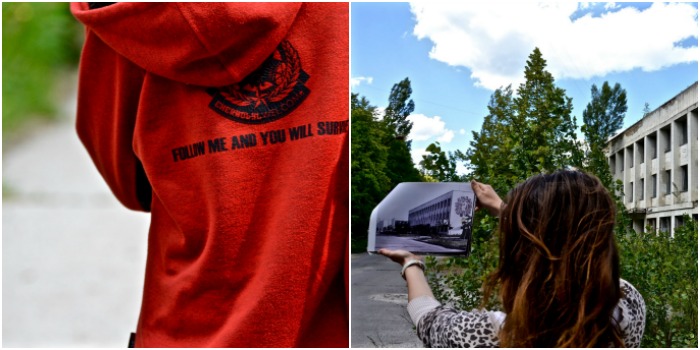 The average trip is one day, but you can stay slightly longer; we opted for two days, which is about the equivalent amount of radiation as going on a long-haul flight.
The average trip is one day, but you can stay slightly longer; we opted for two days, which is about the equivalent amount of radiation as going on a long-haul flight.
We stayed overnight in one of the two hotels there – they’re mainly used by scientists and power plant workers. That’s when it really hit home that we were doing something pretty crazy; at the time there were no actual reviews for the hotel we were staying at.
We flew into Kiev, Ukraine’s capital city, and stayed there a few days beforehand. We met our tour group in Kiev and the guides drove us out to Chernobyl, we took about two and a half hours.
There are checkpoints in both the outer and inner zones, and before we got properly into the Chernobyl exclusion zone we had to read a list of rules and laws and sign our consent.
How did people respond when you told them where you were going?
There was a hugely varied range of reactions. Some people thought we were completely insane and couldn’t believe it; some people reacted by saying they were incredibly jealous. Either way, it always gets an interesting reaction!
What was your first impression of the city?
It was such a huge culture shock, because it’s so abandoned and silent. Nature really has taken over so much of it…you walk on grass and realise there’s tarmac underneath it because it used to be a road. You can see trees growing out through buildings and pavements. The first place we explored was an abandoned building with basically no floor at all.
Even though there were probably 10-12 people in our group, there’s something terrifying about being in a pitch black hospital with abandoned surgery equipment, or being in a desolate kindergarten in a thunderstorm. But nature is everywhere, and you’d never think of it as a city – it’s more like woodland with the occasional road and group of buildings.
You’re also not allowed to dig there, so wherever there’s human habitation huge water pipes run over the roads instead of under.
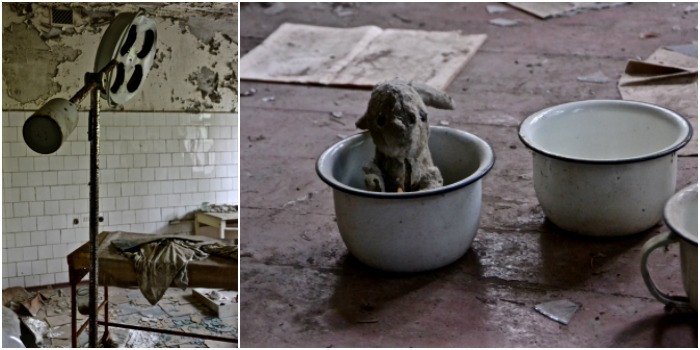 There are certain things you take for granted that suddenly become really jarring. That friendly dog running down a path doesn’t have an owner – but it will follow you because it misses human company.
There are certain things you take for granted that suddenly become really jarring. That friendly dog running down a path doesn’t have an owner – but it will follow you because it misses human company.
That abandoned computer equipment hasn’t been dumped there – it was still in use by someone in recent times but they had to leave it behind. Those open railway lines will never see another train. That toy bear in the nursery will never be picked up and cuddled by a child again.
Are there guides in Chernobyl? Or did you just wander around on your own?
You have to be with at least one guide at all times, and they’re only allowed to spend a certain amount of time in the zone. This applies to all workers there, although there are still occasional villagers that live their permanently and refuse to leave.
Radiation particles have been cleared in the areas that people and tourists go, but there are still hot spots and many places that aren’t safe. In addition to the radiation, there are packs of wild dogs, wolves, collapsing buildings, and various other dangers, so it’s not a safe place to be if you’re not really familiar with it.
Did you have to take any safety precautions to protect yourself from radiation?
Before I went I’d read that we’d have to throw our clothes away, but that turned out not to be true. We had to go through radiation scanners at several checkpoints. We also weren’t allowed to sit down anywhere, put anything on the floor, or roll up our sleeves. This was particularly difficult to remember because we went in the height of summer and it was so easy to roll your sleeves up without remembering it wasn’t allowed!
We were lent Geiger counters to measure radiation levels, but they were just to see different levels of radiation in different areas rather than as a safety precaution.
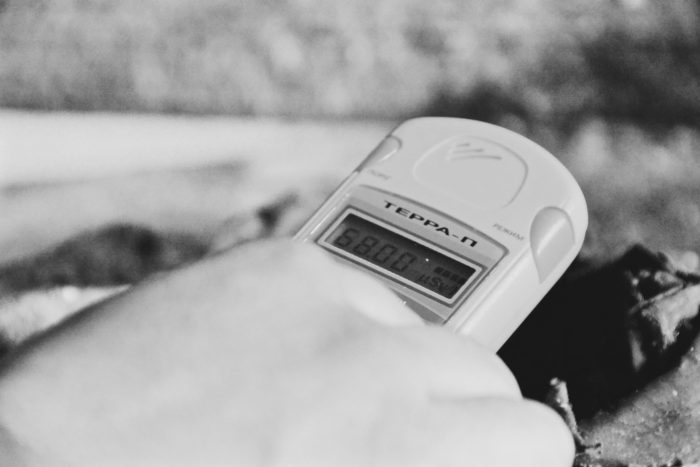
(This is a reading next to a piece of cloth from one of the firefighters who attended the crisis in 1986. By comparison, the average reading in New York City is 0.04 uSv/h).
There are have been stories about the ‘crones of Chernobyl‘ – older women who refuse to leave the dangerously contaminated areas of the city and still live there. Did you see anyone or talk to anyone who was living in the ‘dead zone’?
We met a couple of people, who were initially evacuated along with everyone else but returned to the area because they believed it was safer than the places they were relocated to (debatable!).
They are incredibly self-sufficient and happily grow and cook from the land – though the tour guides politely refuse the food they offer! It’s extremely isolated – there are only a handful of people in the area beyond the power plant, so they welcome visitors and the associated income in small doses.
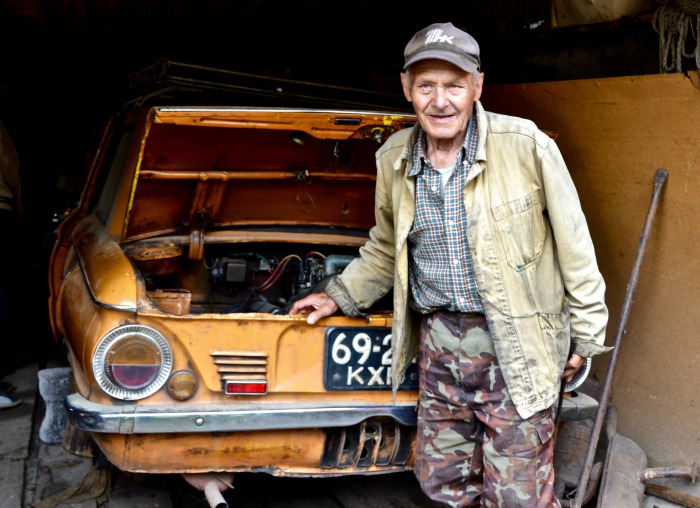
There are people who are opposed to this type of ‘dark tourism’ – who think it monetizes tragedy. How would you respond to that?
There are so many more positives than negatives. A lot of the money raised goes towards directly helping the victims and their families, and raising awareness. It’s also important from an educational perspective. We need to learn what went wrong and how nuclear power can be handled better when it does go wrong.
We also need to acknowledge the sacrifices of the people who went headfirst into danger to prevent another explosion – despite knowing that they were going to die horrifically. It’s important that people’s voices are heard and that the human race learns from these experiences.
Did you learn anything from this experience?
I learned a lot about nuclear power and its effects first-hand, and a lot of surprising things about how nature recovers from something so dramatic. It was strange how quickly we adapted to exploring ruins and how normal the environment seemed by the second day.
I also learned how many people sacrificed their lives, homes, possessions, pets, and so much more because of the fallout and the advice they were given. I definitely didn’t realise the effects of a nuclear explosion could be so varied and wide-ranging: nuclear power really is something that needs to be managed globally.
If someone was interested in visiting Chernobyl, what resources would you point them towards?
Chernobyl Welcome is the best source – they’re really helpful if you have any questions and there’s a lot of information on their website. TripAdvisor is also good, and Atlas Obscura has several interesting articles on the topic.
If you want spoilers, I’ve uploaded a lot of photos to Flickr! If you’re not quite brave enough for the whole experience, there’s a brilliant Chernobyl Museum in Kiev which details everything from the science of the nuclear power plant to the international aid provided after the incident.
Wow! Thanks so much for sharing, Jenni! Have any of you guys visited non-traditional places on your trips? Tell us about it in the comments!





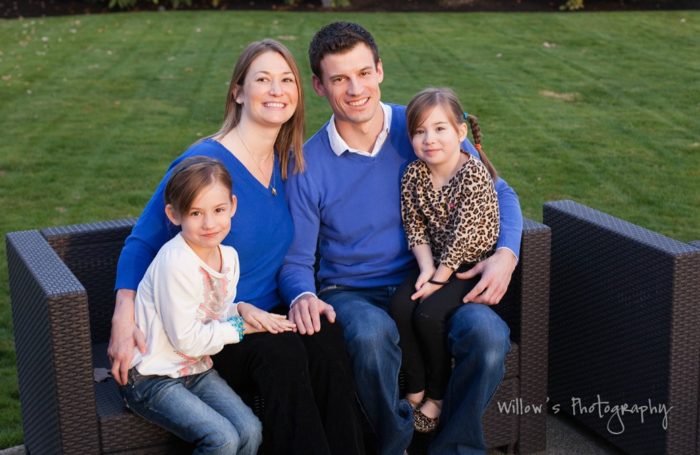






What an eye-opening trip! I think there are many taboos when it comes to travelling to places like Chernobyl, but it’s great to see you really break it. Love your idea of a wild card vacation each year!
Charmaine Ng | Architecture & Lifestyle Blog
http://charmainenyw.com
Wow. Really interesting read.
FYI, there’s a small mistake: “This applies to all workers there, although there are still occasional villagers that live their permanently and refuse to leave.” it should read “live there permanently”. Thanks for sharing!
Thanks for sharing! Visiting Chernobyl is number one on my bucket list!
Thank you for sharing! I’d love to visit Chenobyl, but I’m a bit of an overworrier so I don’t think I’d dare, but this was a great way of travelling with our imagination. That reading on the picture really represents the magnitude of the tragedy! I’ve read Svetlana Alexievich’s “Voices from Chernobyl” so to see that and to think about the experience of those who gave their life to help others is very moving. I recommend the book if you want to learn more.
Wow! This is awesome. I had no idea they gave tours.